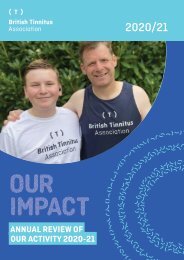Time to listen: A manifesto for tinnitus
Three steps the Government must take to give people with tinnitus hope for a cure
Three steps the Government must take to give people with tinnitus hope for a cure
You also want an ePaper? Increase the reach of your titles
YUMPU automatically turns print PDFs into web optimized ePapers that Google loves.
About tinnitus
• Tinnitus - the perception of noises in the ear/head - affects one in eight people in the UK
• It can have a huge impact on mental health and quality of life
• There is no cure for tinnitus and eight out of 10 patients are dissatisfied with the current
treatment options
• Tinnitus research receives 40 times less funding than comparable conditions like
depression, anxiety and hearing loss, which has led to huge gaps in understanding
Time to Listen 2020
New findings from the ‘Time to Listen’ research of 1,620 people with tinnitus, conducted
by the British Tinnitus Association in January 2020 include:
• One in five people think about their tinnitus at least ‘every few minutes’
• Common sound comparisons include the noise of a jet engine, a whistling kettle,
a dentist’s drill, buzzing bees and fire alarms
• For some the noise is intermittent, for some it is near-constant
• Many experience low mood and sadness and feelings of hopelessness, many socialise
less and feel misunderstood and one in seven experience suicidal thoughts
• One in three say their tinnitus is trivialised by their partner, family, friends, colleagues
and health professional
• Eight in 10 say the low level of funding for research shows it isn’t seen as important
• Seven in 10 say increased funding would give them hope that a cure is possible.
Tinnitus Roundtable
In January 2020 a Tinnitus Roundtable event was hosted by the British Tinnitus Association
at the House of Commons, sponsored by Sir John Hayes MP, who has tinnitus himself. The
event brought together leading academics, politicians, research-funders, patient support
groups, clinicians and people with tinnitus. The group helped to map out a way forward for
tinnitus research, leading to three clear calls for Government, which would enable them to
seize the opportunity to grow the field and make the huge leaps forward that are so close
and so important to people with tinnitus.
Calls to action
1. Commit 1% of the health service cost of treating tinnitus towards research to
find cures - a total of £7.5m per year to be dedicated to research
2. Build a long-term infrastructure to ensure that there is the capacity to deliver the
quality and volume of research needed to make real progress, building on the work of
the committed research community
3. Prioritise studies that will help establish the key foundational knowledge for tinnitus
research, and enable the community to move forward to find cures, including:
a. Identifying tinnitus biomarkers
b. Developing reliable objective measures of tinnitus
c. Identifying tinnitus subtypes
2

















